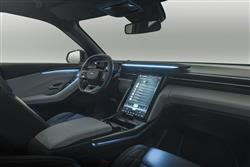Ford Explorer - ABC Leasing
This is a sample, showing 30 seconds of each section.
EX-TREME MEASURES(some text hidden)
By Jonathan Crouch
Ten Second Review word count: 64
This electric Ford Explorer isn't the brand's first EV, but it's the company's first really significant step into this market. A mid-sized SUV that runs on a Volkswagen chassis and powertrain, but in every other way has been developed to look, feel and drive as a European Ford should. It's impossible to over-state the significance here: for its maker, this car has to work.
Background word count: 248
Most car companies are changing simply because they've started making EVs. For Ford, the difference goes a bit deeper than that. Tired of years of losses (£1.6 billion in 2022), the brand's board must have considered following General Motors in pulling out of Europe completely. Instead, they've turned the model range on its head, dispensed with 380,000 staff, closed a key factory (Saarlouis in Germany) and signed off eventual death warrants for Ford's two most recognisable model nameplates, Focus and Fiesta. In place of the Fiesta, at the company's German Cologne plant will be made this car, the Explorer. You might vaguely know the Explorer name because it designates a big SUV hugely successful in the US, marketed briefly in the UK between 1997 and 2001 and lately sold in small numbers (as a Plug-in Hybrid) in Europe. This latest mid-sized Explorer is a slightly smaller SUV than that and of course it's all-electric, sharing its battery, MEB platform and basic architecture with the Volkswagen ID.4 as part of an agreement with Volkswagen which Ford reciprocates for by building VW-badged commercial vehicles in South Africa and Turkey. But you want to know about the Explorer, created as one of the company's four new 'product banner' sales categories, this one categorising SUVs and known as 'Adventurous Spirit'. The Blue Oval maker insists that, despite the shared underpinnings, this is a proper Ford in the way it drives, the way it looks and its cabin feel. Is it? Let's see.
Pictures (High res disabled)

.jpg)
.jpg)
.jpg)
.jpg)
.jpg)
.jpg)
.jpg)
.jpg)
.jpg)
.jpg)
.jpg)
.jpg)

Scoring
Category: Compact Car
| Performance | |
| Handling | |
| Comfort | |
| Space | |
| Styling | |
| Build | |
| Value | |
| Equipment | |
| Economy | 70% |
| Depreciation | 60% |
| Insurance | 70% |
| Total | 70% |